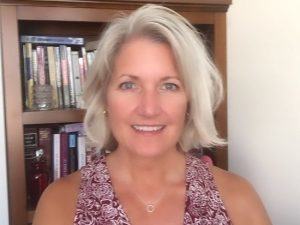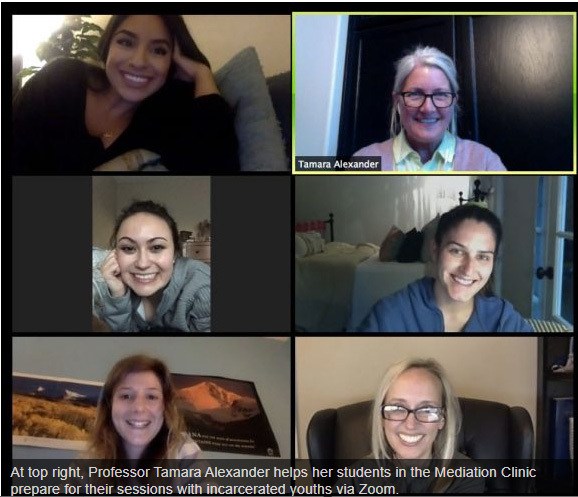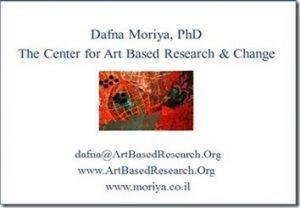Stay Connected: Union alumni respond to COVID-19 (Third Edition)
Welcome to the third edition of Stay Connected where we share how Union students and alumni are responding to the pandemic.
Stay Connected during these challenging times by sharing information, helpful tips, and encouragement to your fellow Union students and alumni. Send your updates, ideas, comments, and questions to: alumni@myunion.edu or to Carolyn.Krause@myunion.edu or connect with us on SHARE YOUR STORY.
Alumna incorporates video conferencing platforms so students and incarcerated youth don’t miss a beat
 Alumna Tamara Alexander. Ph.D. 2015, co-director of the Fowler School of Law Mediation Clinic at Chapman College in Orange, California, knows distance learning works. She experienced it first-hand when earning her doctoral degree at Union through its rich online learning environment. Alexander’s focus was on public policy and social change.
Alumna Tamara Alexander. Ph.D. 2015, co-director of the Fowler School of Law Mediation Clinic at Chapman College in Orange, California, knows distance learning works. She experienced it first-hand when earning her doctoral degree at Union through its rich online learning environment. Alexander’s focus was on public policy and social change.
When state mandates required everyone to stay at home to mitigate the spread of the pandemic, she quickly created a platform for her students and the incarcerated youth they serve to meet virtually. “There is absolutely no reason why our learning and delivery needs to hiccup,” said Alexander in a recent interview with the Chapman University newsroom.

Alexander is co-director of Fowler School of Law Mediation Clinic that incorporates real-world understanding for law students to develop and practice mediation skills under the supervision of experienced attorney mediators. Students may participate in the Mediation Clinic at the Riverside or Orange County Superior Courts, the Riverside County Criminal Justice Dispute Resolution Clinic, or the Riverside County Restorative Justice Program. These valuable services are provided pro bono to the community.
Her law students have been able to continue their important work with incarcerated youth in the Restorative Justice Program delivering conflict resolution skills.
Dr. Alexander’s Union dissertation research investigated the convergence of evidence to understand how a church advanced itself as a moral entrepreneur within the policy arena to align against LGBT equality. Her dissertation is titled, “Exploring the LDS Church’s Wins in Two Same-Sex Marriage Elections: Mobilizing Members, Election Strategies, and Message Framing,” and was completed under the supervision of Mary Ann Steger, Ph.D.
Read more about Alexander and her important work at this link.
The show must go on

Alumna Dafna Moriya, Ph.D. 2015, was in the second week of her solo art exhibition, “Hidden details/ Dafna Moriya” when the pandemic hit and everything began to close.
“The disappointment was huge. Inspired by my studies at Union, I was looking for a way to turn this into an act of resilience. I created a video and invited people to a virtual tour of my show. The response was amazing. People found it to be “a moment of tranquility” and a “healing experience.”
Moriya credits her philosophy to turn adversity into advantage to her Union experience.
“Studying at Union influenced my thinking in many ways. Coming from a more traditional approach to research, the notion that the person can and should inform academic thinking was new to me. As a result, my daily work, my workshops, and my book, Navigating Visual Imagery and Verbalization, now integrate my personal, artistic and academic thinking.
My personal experience with the exhibition led me to share the video with the world and also inspired me to conduct an international survey regarding other people’s experiences with art during “Corona-time.” (The survey is still open. To participate please write to dafna@abrch.org)
Dr. Moyira also reflects on seeing her story through her peers’ eyes, which gave her a new appreciation of the importance of resilience for her family, country, and humanity.
“My experience as the only Israeli student in my cohort, and sometimes the only Israeli person my peers have met was eye-opening too. While my family’s story is very common in Israel, at Union, I had the opportunity to tell it “from the outside.” This is the story of refugees who were fortunate to escape Europe in time before World War II. Others in my family, who stayed were all killed in the concentration camps. My grandparents, a young couple with two children, left everything behind and came to Israel. There is no stage in our narrative that even includes the word refugee. The history books have a chapter for the holocaust, and then for revival.”
Dr. Moriya is the founder of the Center for Art-based Research and Change. An artist, independent scholar, and educator, she gives lectures and leads workshops around the world. She teaches and supervises art-based researchers, art therapy practitioners, and supervisors involved in art-based activities for social change. She also exhibits her own artwork.
View Hidden Details/Dafna Moriya. To participate in the international survey regarding other people’s experiences with art in “Corona-time” email dafna@abrch.org.
Stay Connected during these challenging times by sharing information, helpful tips, and encouragement to your fellow Union students and alumni.
Send your updates, ideas, comments, and questions to: alumni@myunion.edu or to carolyn.krause@myunion.edu
OR
Share connect with us on SHARE YOUR STORY